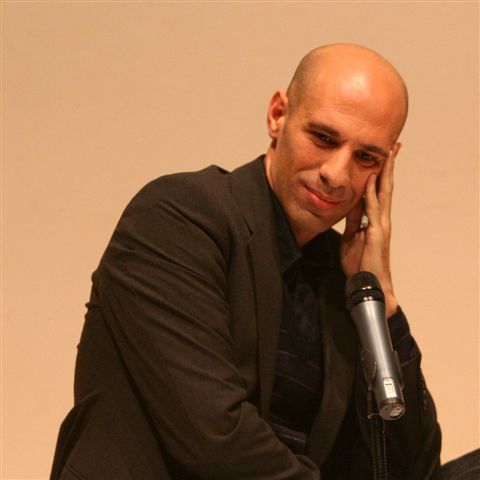 The audience was waiting with anticipation, ready for the workshop given by writer/journalist Abdelkader Benali. Unfortunately Abdelkader Benali was stuck in traffic. Although Holland is a relatively small country, the traffic is an absolute nightmare, especially on a Friday afternoon. But the visitors didn’t mind. Everyone just got an extra cup of coffee and waited patiently.
The audience was waiting with anticipation, ready for the workshop given by writer/journalist Abdelkader Benali. Unfortunately Abdelkader Benali was stuck in traffic. Although Holland is a relatively small country, the traffic is an absolute nightmare, especially on a Friday afternoon. But the visitors didn’t mind. Everyone just got an extra cup of coffee and waited patiently.
Benali started the workshop by saying that he was very sorry for the delay and gave an anecdote about his trip from Utrecht to Eindhoven. In Utrecht, coming from another lecture, he was picked up by someone who was going to bring him to Eindhoven, they were strangers to each other. Then something happened. The stranger started to ask questions. ,,He asked me,’’ Benali said. ,,What are you going to do in Eindhoven? It’s the question I most dreaded. It pushed me to the limit to talk about my whole existence. So I answered: I think I want people to tell someone else a story. My driver said that this must be very exciting. I agreed.” Benali confesses that he is not really a fan of small talk with complete strangers: ,,But when you’re in a car with someone else and stuck in traffic, you can’t get out of it. You don’t need much motivation to talk to someone. I tried not to get to know him, but the thing is, in these kind of conversations you get to know each other much better than the audience at my lectures and workshops. So I know that my driver is a great fan of cars, owns three motorbikes and suggested I should get a Honda.”
However, he soon went down to business and started his workshop. He used the essay ‘The Storyteller’ by sociological and cultural critic Walter Benjamin to answer the following question ‘Can literature Obliterate Identity?’. ,,A short summary of this essay would be that we can all be writers, but we can’t all be storytellers. A writer likes to control the story, a storyteller just likes to see where it will end. A storyteller can give up control, storytellers start a dream. Writers usually write the end of a thought and look for a counterpart, an important moment in the story when he knows he’ll have a good story.”
,,When the Twin Towers fell down,’’ Benali remembers. ,,we all turned to writers, people who could control this immense amount of information. We mistrusted the media. There was so much information, so much noise, only writers could offer us some sort of help.” Unfortunately, Benali says, they failed. ,,Writers who tackled this subject tried to control the information and tried to come up with a conclusion. That was wrong.”
Originally from Morocco, Benali often goes back to this land and enjoys the lack of information. ,,The first thing I do in the morning when I’m there is look for a newspaper. It’s hard to find. The people there don’t trust information that doesn’t come from the village itself, the people who live there. They think the newspapers, media, invent things. It’s the same with writers, they create information. In a way writers give voices to people who can’t speak.”
For more information on Abdelkader Benali please visit here
For more information on Walter Benjamin and his essay ‘The Storyteller’, please visit the following websites: here and here